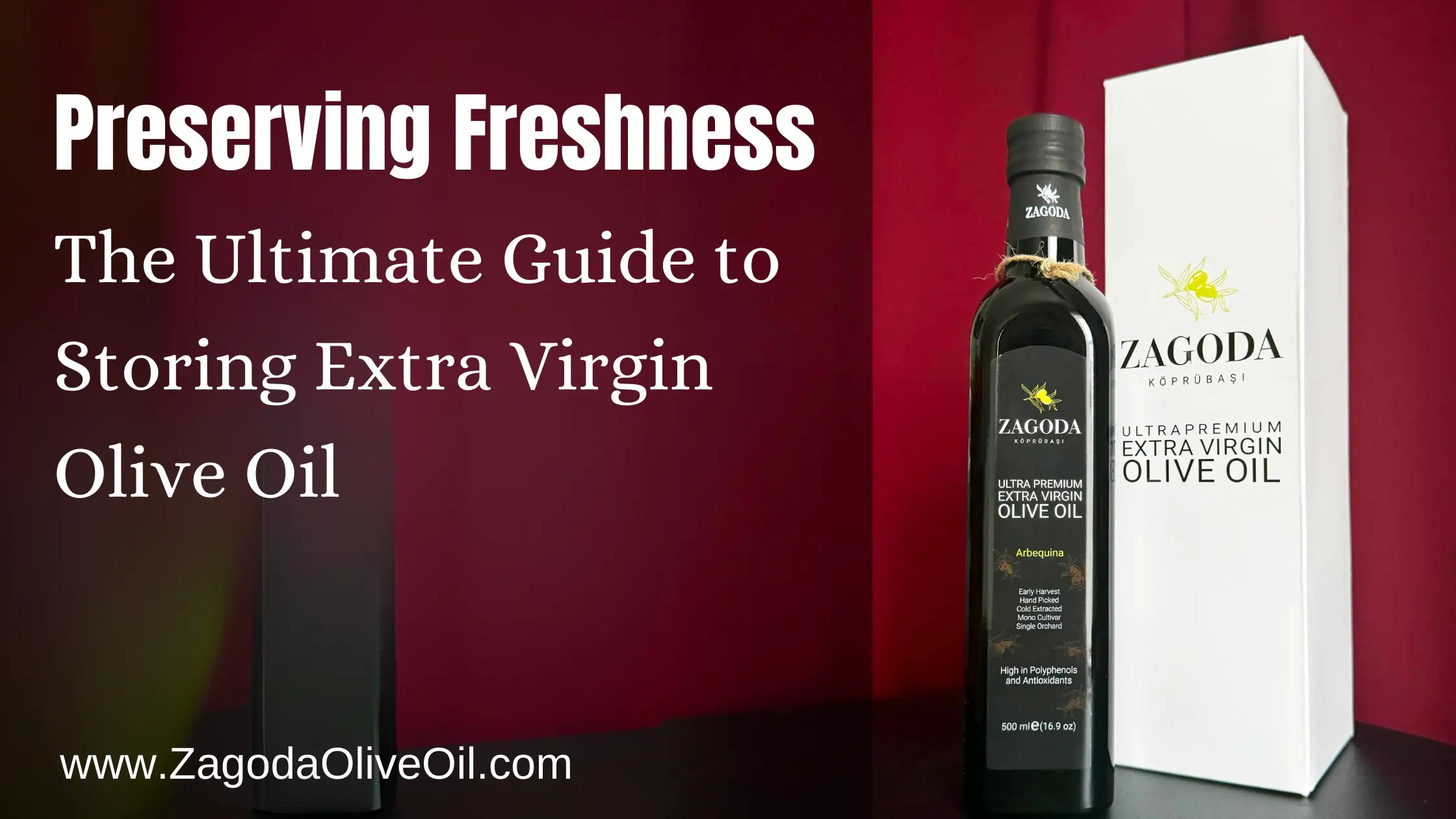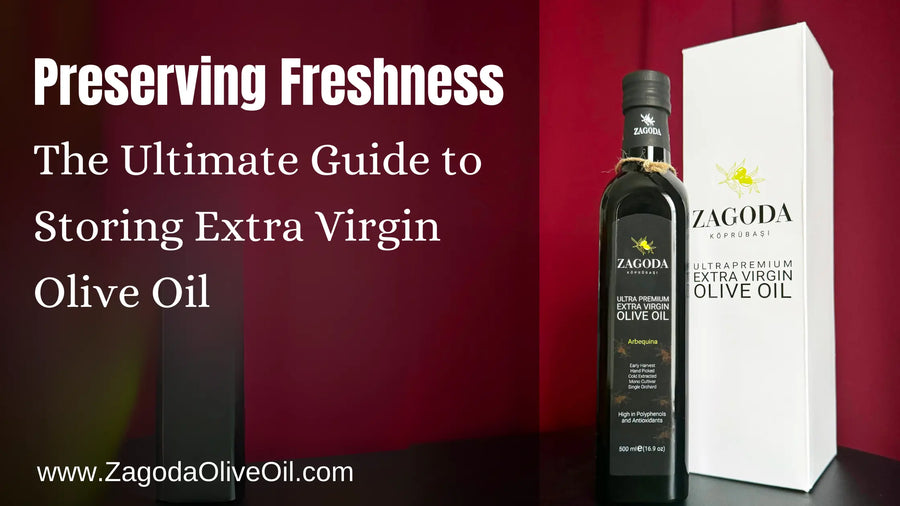How to store extra virgin olive oil? It is the most frequently asked question by people.
Extra virgin olive oil is a valuable item known for its cooking variety and health advantages, but maintaining its flavor and purity requires proper storage. Whether you're a dedicated home cook or just interested in food, properly storing this liquid gold will help you keep its nutritional value and freshness.
Heat, light, or oxygen exposure can cause olive oil to go rancid and taste bad. Applying rancid oil might taint your food's flavor even if it might not make you sick. To maintain its best flavor, store olive oil in a cold, dark place at all times. Improper storage might cause the oil to lose its fresh flavor and scent even if it isn't sour.
This article will tell you the best tips for storing olive oil at home.
Explore the Top-Notch Factors Affecting the Quality of Olive Oil
The following are the basic characteristics and factors you must notice in the quality of olive oil
Color of oil
The color of extra-virgin olive oils can range from a deep green to one that is intensely yellow with green tones or vice versa. The kind and ripeness of the olives in addition to the type of extraction machine and its operation are the main determinants of color variations.
Except for red tones which are the result of beta-carotene and chlorophyll breakdown and show when oil has been exposed to light, no color alone can indicate whether oil quality is good or bad. In this instance, the green color of the chlorophyll disappears and the carotenoids' dark reddish color shows through.
Air
It's important to remember to replace the bottle top to prevent oxygen contact that can speed up the oxidation of oil. Oil cruets may be charming in their old-world way, but nothing beats them in tainting even the finest extra-virgin olive oil.
They only have a cap in rare cases, therefore the small amount of oil within is exposed to a lot of oxygen. Every time we add new oil to the cruet because the container is continuously being filled.
The old oxidized oil that is still in the bottle serves as the ideal catalyst to restart the oxidation process. Cruets were outlawed a few years ago at eateries and other establishments that served food. In this way, we can easily bottle olive oil at home.
Heat
The oil has solidified due to low-temperature storage, as indicated by the presence of lumps that resemble very pale rice grains.
This does not affect the oil's nutritional value or organoleptic properties; it will return to a liquid condition as soon as it is placed in a warm environment.
Higher temperatures have the potential to quickly degrade oil thus decreasing its flavor and nutritional content.
Time
Olive oil loses quality over time, much like any perishable commodity, but if it is stored properly, it will deteriorate more gradually.
The Best Ways to Keep Extra Virgin Olive Oil:
Here are some tips to make sure the quality and freshness of your extra virgin olive oil lasts:
Choose the Right Container:
Select dark-colored glass bottles or containers composed of materials that protect against light exposure. Steer clear of clear glass and plastic containers; they offer insufficient light protection.
Hold on to it Chilled:
Keep your olive oil out of direct sunlight and in a dark, cool spot that isn't near heat sources like stoves or ovens. The range of recommended storage temperatures is 14°C to 18°C (57°F to 64°F).
Close it Tight:
Make sure the container is shut tightly to prevent air exposure, which hastens the oxidation process. To keep freshness, use bottles with airtight lids or caps.
Avoid temperature fluctuations:
These might harm the quality of olive oil. To avoid temperature swings, use a storage area with consistent temperatures.
Reduce Oxygen Exposure:
To reduce the quantity of oxygen that comes into contact with the oil when you use it try to have as little headspace as possible in the container. Once you use up the oil, think about transferring it to smaller bottles.
Check Expiration Dates:
Even while extra virgin olive oil lasts longer than refined oils, it's still important to use it before it expires.
Common Questions about How to Store Olive Oil
How long does Olive Oil keep once opened?
Extra virgin olive oil keeps well for up to two years after it is opened, provided it is stored properly. Its flavor and fresh aroma remain far longer than those of inferior oils.
How to prevent oil from going rancid?
Store your oil at room temperature, out of direct sunlight, and in a dry, dark place. As a result, there will be less light, heat, and air, all of which accelerate the rancidity rate mentioned previously. It will also keep the aroma and flavor intact. Get your oil packaged in dark or colored containers as well.
Should I store Olive Oil in the fridge?
Keep it in proper storage. Because it is exposed to continuous heat, olive oil shouldn't be kept next to the stove. Furthermore, it is not advised to keep oil refrigerated since condensation inside the bottle might produce odd flavors. Keep your oil in a cupboard or cabinet that is cold and dark.
What kind of oil does not solidify in the fridge?
Every Plate Culinary Development Manager Sara Heiman states, "Sesame oil is susceptible to heat, light, and oxygen exposure, but it will not completely solidify when stored in the refrigerator like olive oil." It will taste bitter and has the potential to go rotten if improperly stored.
Conclusion
In the end, we want to make sure you're storing olive oil properly because, for many home cooks, it's one of the most expensive commodities in their kitchens. This enables you to maximize the use and pleasure of every bottle!
This is a great moment to assess how you currently choose and store your cooking fat. Look through the cupboards to see if anything has gone bad. And it's alright if you do. Some decent options for expired products can be found in this post.


